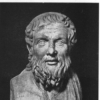Apollonius of Tyana

Apollonius of Tyana
Apollonius of Tyana, sometimes also called Apollonios of Tyana, was a Greek Neopythagorean philosopher from the town of Tyana in the Roman province of Cappadocia in Anatolia. Being a 1st-century orator and philosopher around the time of Jesus, he was compared with Jesus of Nazareth by Christians in the 4th century and by other writers in modern times...
NationalityGreek
ProfessionPhilosopher
believe despot itself man popular prone scandal
Never may a man prone to believe scandal be a despot or a popular leader! Under his guidance, democracy itself will be despotism.
action anger fault himself impulse laziness love man odious render understand vices wise yields
A man must fortify himself and understand that a wise man who yields to laziness or anger or passion or love of drink, or who commits any other action prompted by impulse and inopportune, will probably find his fault condoned; but if he stoops to greed, he will not be pardoned, but render himself odious as a combination of all vices at once.
arabia armed beasts commonly crooked heads horrible man nor seen wider
In my travels, which have been wider than ever man yet accomplished, I have seen many, many wild beasts of Arabia and India; but this beast, that is commonly called a Tyrant, I know not how many heads it has, nor if it be crooked of claw, and armed with horrible fangs.
account fear hail left man shall superior
If any man has left us for fear of Nero, I shall not account him a coward; but I shall hail as a philosopher any man who has been superior to this fear, and I shall teach him all I know.
man perceive
It is a true man's part not to err, but it is also noble of a man to perceive his error.
I have not yet learned to keep still.
begin good time
Don't keep your good manners to the end another time, but begin with them.
helping incapable love presumably single singular unless
Every argument is incapable of helping unless it is singular and addressed to a single person. Therefore, one who discourses in any other way presumably does so from love of reputation.
cares cause festivals increase lighten since
Festivals cause diseases, since they lighten cares but increase gluttony.
human knowing truth understand wonder
You need not wonder at my knowing all human languages; for, to tell you the truth, I also understand all the secrets of human silence.
diseased godlike higher tend
Pythagoras said that medicine is the most godlike of arts. But if the most godlike, it should tend to the soul as well as the body, or else a living thing must be unhealthy, being diseased in its higher part.
both imperial understood
Nero may have understood how to tune his cithern, but he disgraced his imperial office both by slackening and by tightening the strings.
contains equivalent stones subject theaters unless useless wisdom
Multicolored stones and paintings, walkways, and theaters are useless in a city unless it also contains wisdom and law. Such things are the subject of wisdom and law, not equivalent to them.
friendship future neither nor towards
I feel friendship towards philosophers, but towards sophists, teachers of literature, or any other such kind of godforsaken people, I neither feel friendship now, nor may I ever do so in the future.